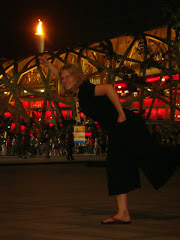

http://en.beijing2008.cn/volunteers/news/n214419251.shtml
is the address of a story that "Leslie", the journalist pictured doing calligraphy below, wrote about my friend David and my experiences during calligraphy class. Some of the things we say are pretty funny (and we don't remember really saying them...) and we may or may not sound like 5-year olds. Either way, I think it's pretty awesome.
Since I'm not getting the link to work properly, I've copied/pasted it here for your convenience.
Olympic Volunteers from U.S. Learn Calligraphy
BEIJING, June 24 (Xinhua) -- "It's just like drawing a picture," Emily Doolittle said as she was trying to write Chinese characters at a calligraphy class here on Tuesday.
Doolittle is one of the 24 students from the University of Iowa in the United States, who started their week-long orientation course on Chinese culture, environment, economy, media and ethnic minorities at Tsinghua University as of Monday.
"I once took a Chinese calligraphy class in my university two years ago. It was really hard to figure out how to write Chinese characters," Doolittle told Xinhua.
Gao Yuan, teacher of the calligraphy class, started with the origin of the Chinese characters, and then went on with the discovery of oracles.
Gao pointed out that the idea of the Olympic emblem comes from the Xiaozhuan style and the seal, which the Chinese people always use for signature.
"I ever learned the oracles of mouth and water. It's so cool! The shapes of the characters look like what they are in reality," Doolittle said.
Following Gao, she put down time and time again the Chinese characters of Beijing, the Olympic Games as well as the University of Iowa of the United States.
Having known her Chinese name Du Kaili means victory plus beauty, Doolittle couldn't be more exciting. She wrote down her Chinese name, of which she also took photos.
David McNace, who has learned Chinese for two semesters, got very proud of his Chinese name Mai Dawei that was given by his Chinese teacher in his university.
"We used to read names backwards, so my name sounds like Weida (great in Chinese)," McNace said to Doolittle, showing his pride. "You see, my name is full of greatness."
"I will hang it (his name) on my door when I'm back," McNace added after he finished his Chinese name on the paper.
After taking the Chinese culture course, they will join the other 268 overseas Olympic media volunteers in the training by the Beijing Organizing Committee for the Olympic Games (BOCOG) and serve media operation during the Games.
They will work at the Main Press Center or the International Broadcast Center or with particular sports such as tennis and wrestling.
According to the BOCOG, some 22,000 overseas Olympic volunteers will come to China for the upcoming Games this year.

1 comment:
saludos desde Esquel, Patagonia Argentina.
Mauro Mateos
Post a Comment